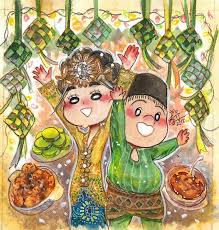Muslims in Singapore recollect their confidence with supplication and reflection during Hari Raya Haji, otherwise called the Festival of Sacrifice.
Enduring four days, Hari Raya Haji honors Prophet Ibrahim’s (Abraham’s) finished confidence and trust in God.
This is related in the tale of God telling Ibrahim to forfeit his child Ismail (Ishmael), a rule that Ibrahim reacted to with submission. God halted him, and furnished him with a sheep to substitute as a penance, rather than his child.
Petition and penance
During this period, the dedicated dress in their best garments and gather in mosques to tune in to messages and offer their supplications.
In any case, the most significant custom saw here is that of ‘korban’ (penance). Admirers contribute live sheep, sheep, goats and bovines, which are butchered by a brisk cut to the jugular as supplications are discussed
This demonstration helps admirers to remember the readiness of Prophet Ibrahim to present even his very own fragile living creature and blood to God. The creature is then tidied and the meat cut up and appropriated to admirers and the penniless.
Philanthropy and confidence
Muslim man inside a mosque
Photograph by Public Domain
The custom is that the individual who paid for the creature gets 33% of the meat and 33% goes to loved ones. As this celebration is about sympathy, sharing riches and recalling favors, the last third is generally appropriated to poor people and the penniless.
After this, Muslims pay social visits to guardians, families and companions, and unwind over a dinner together.
There is minimal obvious devouring or fun—this is one celebration that is more about profound needs than physical ones.
Foundation
Hari Raya Haji is commended to stamp the Muslim journey known as the haj. As per the fifth mainstay of Islam, all physically fit Muslims who can stand to do so are obliged to embrace this journey in any event once in their lifetime.2 The haj backtracks the adventure of Prophet Muhammad’s journey to Mecca and must be attempted during Zulhijjah, the twelfth month of the Islamic calendar.3
The celebration likewise recognizes the narrative of Ibrahim and his child Ismail, both of whom were said to have been guided by Allah to construct the Kaaba: a square stone structure in the focal point of the Great Mosque in Mecca that is considered by Muslims to be their most sacred site. It is toward the Kabaa that all Muslims face during prayers.4
As per the story found in the Quran, Allah one day directed Ibrahim to forfeit his child Ismail as a trial of his acquiescence. Similarly as Ibrahim was going to do this direction, Allah interceded to stop him and took into account the penance of a sheep instead of his child. Ibrahim’s commendable demonstration of penance and submission to Allah is celebrated during Hari Raya Haji through the custom of korban, which includes the conciliatory offering of livestock.5
Ceremonies and practices
Fasting and petitions
Not at all like during Ramadan when all Muslims are required to quick day by day from dawn to dusk for a whole month, fasting for Hari Raya Haji is generally done on the eve of the celebration (known as Wukuf) and isn’t mandatory. Upon the arrival of the celebration, Muslims first accumulate in quite a while for congregational petitions before completing the korban ritual.6
Korban custom
The korban is one of the most noteworthy customs of Hari Raya Haji. The custom is viewed as a sunnahmuakkad (non-necessary however firmly suggested commitment) and should be possible exclusively or as a gathering. Muslims who can manage the cost of it are urged to play out the korban.7
The penance ceremonial starts by confronting the creature to be yielded toward the Kabaa and expressing a prayer.8 The jugular vein at the creature’s throat is then cut rapidly to guarantee a speedy demise, generally inside a moment. The creature is then tidied and its meat cut up for distribution.9
As the korban implies a penance of anything significant, domesticated animals, for example, sheep, goats or bovines are typically picked as the advertising. The individual who forfeits the creature keeps 33% of the meat, while the staying 66% are imparted to companions, neighbors and poor people and needy.10
In Singapore, the ceremonial happens at mosques and strict schools. The korban might be performed by the benefactor or by designated butchers at the individual butcher sites.11
Other than its strict essentialness, another goal of the korban is to raise assets for the different Muslim associations and mosques offering korban administrations. The assets are to help with their upkeep and instructive programmes.
Count of the date
There is no fixed date on the Gregorian schedule for Hari Raya Haji. Like every single Islamic celebration, the date for Hari Raya Haji depends on galactic counts that depend on the locating of the new moon and in this manner contrasts from year to year. In Singapore, the Islamic Religious Council (referred to in Malay as MajlisUgama Islam Singapura, or MUIS) is answerable for deciding the date of the celebration each year.13 Hari Raya Haji is assigned as an open occasion in Singapore.
Ongoing improvements
Sourcing for korban domesticated animals
One of the significant issues that has tormented Hari Raya Haji festivities as of late is the shipment of the domesticated animals required for the korban. On a few events, the shipments were deferred, driving the retraction or the delay of korban.14
MUIS assumed control over the bringing in of creatures for korban in 1992. In any case, the association reported in June 1997 that it would never again hotspot for the creatures required for korban and would hand over the obligation to the mosques. On its part, MUIS would keep giving rules with respect to the bringing if livestock.15
Performing korban abroad
Another pattern that has created as of late is the performing of korban abroad. Numerous Muslim Singaporeans have given animals for korban to both Islamic and non-Islamic nations as a feature of their philanthropy and helpful aid projects. After the korban custom is played out, the meat is disseminated to the less lucky in these countries.16
In 2005, a gathering of Muslim Singaporeans gave cows for the korban to the occupants of Banda Aceh. This was in done to help those local people who had been influenced by the December 2004 tidal wave, which had happened only one month before Hari Raya Haji.17
Some Muslim Singaporeans additionally observe playing out the korban abroad as a chance to bond with their family members who live abroad in places like Malaysia.18
Another explanation behind some Muslim Singaporeans liking to play out the korban abroad is the moderately lower costs contrasted with completing the custom locally.19 This is on the grounds that the cost of korban sheep in Singapore has been expanding quickly because of horrible trade rates, falling supply of domesticated animals, swelling and greater expenses of coordinations and transport. In 2011, the expense of every sheep was S$443.50, a 50 percent expansion from the prior year. It was then the most elevated recorded cost for korban sheep.20 In 2012, the cost for every sheep expanded further to S$465.21
Australian trade guidelines on korban domesticated animals
In 2012, Australia – the fundamental wellspring of korban domesticated animals for Singapore – forced new guidelines on remote animals exporters. The new rules remembered giving more space for every creature for the holding pen, enabling just prepared staff to complete the butcher in a quick and empathetic way, and the requirement for the butcher blade to be double the length of the creature’s neck. All these new guidelines implied that the expense of the korban customs would increment further.22
Following the new decisions, MUIS and the Agri-nourishment and Veterinary Authority (AVA) completed preparing for those associated with butchering the creatures. Free reviewers likewise did reviews on the korban procedure at the different mosques and presented the reports to the Australian government.23 that year, the Australian government endorsed the fare of 2,500 sheep for korban at16 mosques and two associations. These focuses met the essential criteria set out by global creature welfare standards.24
Muslim Singaporeans were exhorted by the specialists to consider playing out the korban abroad as Australia may in the long run choose to boycott the fare of live creatures for korban. The administration additionally reported that it was searching for different sources past Australia for korban livestock.25
Hari Raya Haji
(which signifies “incredible day of the haj” in Malay), otherwise called Aidiladha (on the other hand spelt as Eid al-Adha or EidAdha) or the Great Day of Sacrifice, is a Muslim celebration that falls on the tenth day of Zulhijjah (the twelfth month in the Islamic schedule). It likewise celebrates the readiness of the Islamic prophet Ibrahim to forfeit his child Ismail in a demonstration of submission to Allah (God). One of the primary ceremonies of the celebration is the korban, which includes the conciliatory butchering of livestock.1 It is one of two significant Muslim celebrations in Singapore that are commended as open occasions (the other being Hari Raya Puasa).
You’re looking at the most trusted maxi cab transportation services in town. We have been in the maxi cab transportation industry for more than 10 years now and giving our 100% quality of service to our clients is our commitment.
We serve you with PUNCTUALITY, HONESTY and PROFESSIONALISM.
We have over three thousand Limousine, 4-seater Mercedes taxi/car, 6-7 seater White/Black Maxicab,Toyota Vellfire and Alphard, and a 13-seater Toyota Hi-Ace, ready to serve you. Booking is Free….BOOK NOW PAY LATER
We offer different maxi cab transportation services that will fit and meet your expectations. For Maxi Cab Booking Click here.








